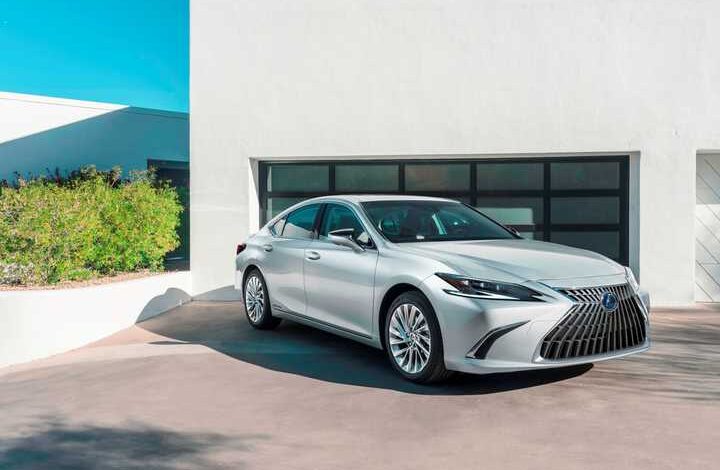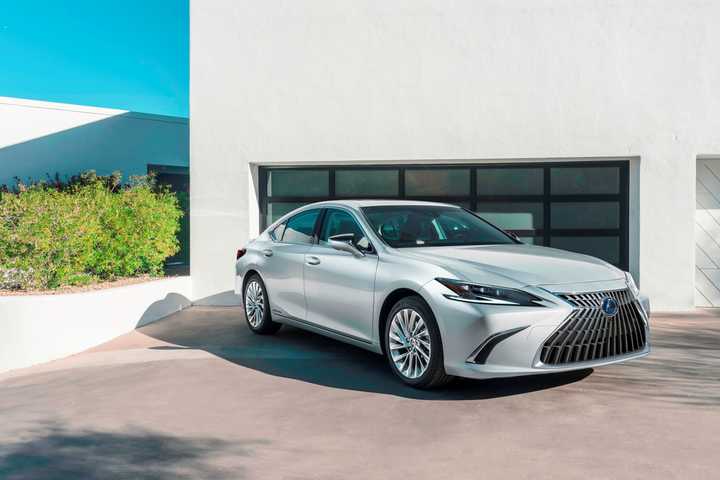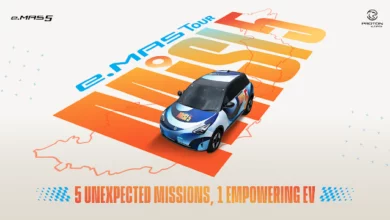Here’s How Much The Lexus ES Hybrid Depreciates After 3 Years

The all-new generation Lexus ES will be hitting national dealerships within the coming months, bringing with it a hybrid-only drivetrain option and outlandish interior and exterior design language that ushers the Japanese company into a new era of futurism. While it introduces a dramatic design change, the new model will stay true to its roots of being an upmarket sedan that doesn’t compromise reliability or efficiency. With that being said, there’s still a lot of value in considering the existing 2025 model, despite its imminent replacement being just around the corner.


- Base Trim Engine
-
2.5L I4 Hybrid
- Base Trim Transmission
-
CVT
- Base Trim Drivetrain
-
Front-Wheel Drive
- Base Trim Horsepower
-
176 HP @5700 RPM
- Base Trim Torque
-
163 lb.-ft. @ 3600 RPM
One area where the Lexus ES 300h tends to excel is in long-term value retention. Premium sedans of this nature, especially gasoline-electric hybrids, tend to lose a lot of their purchase value the moment you drive them off the dealership floor. The ES is no exception to this, but its value loss is nowhere near as poor as its main rivals. This makes it a more logical choice for you to consider if you’re looking for a luxurious sedan experience that you only intend to keep for around three years. If this matches what you’re currently on the lookout for, this is more or less how much you can expect to lose.
To give you the most up-to-date and accurate information possible, the data used to compile this article was sourced from Lexus and other authoritative sources, including the EPA, Edmunds, J.D. Power, and iSeeCars. The values quoted in this feature are based on analytical data and may not accurately predict the depreciation rates of existing models, so consider them as guidelines.
The 2025 Lexus ES Loses $15,176 In Three Years
By Premium Car Standards, This Isn’t Too Bad
According to the Edmunds True Cost To Own calculator, you can expect a base-level Lexus ES 300h to lose $15,176 of its initial purchase price after three years and $21,107 after five years and 60,000 miles. $8,894 of this loss occurs after the first year of ownership. Additional costs during this period include $5,771 on maintenance, $1,087 on repairs, and $8,382 on fuel.
According to CarEdge, you can expect the very same model to lose 44 percent of its value over three years while covering 12,000 miles a year, resulting in a $24,769 sale price. By 10 years, it’ll be worth about $13,770, reflecting a 30.86-percent residual value.
Lexus ES True- Cost-To-Own Estimates
|
Year 1 |
Year 2 |
Year 3 |
Year 4 |
Year 5 |
Total |
|
|---|---|---|---|---|---|---|
|
Insurance |
$1,711 |
$1,771 |
$1,833 |
$1,897 |
$1,963 |
$9,175 |
|
Maintenance |
$236 |
$924 |
$525 |
$1,476 |
$2,610 |
$5,771 |
|
Repairs |
$0 |
$0 |
$0 |
$429 |
$658 |
$1,087 |
|
Taxes & Fees |
$4,374 |
$324 |
$302 |
$283 |
$263 |
$5,546 |
|
Financing |
$3,156 |
$2,546 |
$1,892 |
$1,187 |
$431 |
$9,212 |
|
Depreciation |
$8,894 |
$3,458 |
$2,824 |
$3,165 |
$2,766 |
$21,107 |
|
Fuel |
$1,579 |
$1,626 |
$1,675 |
$1,725 |
$1,777 |
$8,382 |
|
True Cost to Own |
$19,950 |
$10,649 |
$9,051 |
$10,162 |
$10,468 |
$60,280 |
iSeeCars backs this with an 8.7/10 overall score, which includes 8.6/10 for reliability, 7.6/10 for retained value, and 10/10 for safety. The publication indicates that you can expect the model to lose 30.3 percent or $13,151 of its value over three years, resulting in a $30,289 residual value figure.
Its reliability assessment also indicates that it benefits from an average lifespan of 15.9 years and should cover 174,223 miles without any major mechanical faults. Its probability of reaching 200,000 miles is 32.7 percent if you typically drive 10,362 miles every year. J.D. Power awards it an 82/100 consumer-verified overall rating, which includes 88/100 for quality and reliability, 73/100 for the driving experience, and 74/100 for resale, alongside an 87/100 rating for the dealership experience.
The 2025 Lexus ES 300h Starts At $44,835
The Most Expensive Model Costs $53,505
The Lexus ES 300h is one of the best HEV cars you can buy for less than what you would spend on the average new car in 2025. The premium American-based Japanese brand kicks pricing off at $44,835 for the entry-level trim. Despite being a base model, it comes equipped with all the comfort and convenience features you’ll need, including dual-zone climate control, electrically adjustable front seats with heating, and perforated NuLuxe interior upholstery. You also get the eight-inch touchscreen infotainment system connected to the brand’s in-house-developed 10-speaker premium audio system. It also features wireless Android Auto and Apple CarPlay.
The $50,005 Luxury is admittedly more expensive than the average new vehicle in the U.S., but you get the added benefit of additional adjustments for the driver’s seat, quilted and perforated semi-aniline leather upholstery, front seat heating and ventilation, wood trimmings, ambient lighting, an electronically adjustable rear sunshade, a wireless smartphone charger, and a heated multifunction steering wheel with wood and leather trimmings.
The Luxuries Only Get More Opulent
The Ultra Luxury is the most expensive model in the range, with a $53,725 starting price, but this includes every available feature as standard, such as rear door sun shades, a 10.2-inch heads-up display, and the larger 12.3-inch touchscreen infotainment system.
The F-Sport Design costs $49,220 and mimics the Luxury trim, apart from a couple of bespoke visual exterior and interior cues. For $51,130, you can upgrade this to the F Sport Handling package, which adds performance dampers, adaptive variable suspension with bespoke F Sport tuning, and additional driving modes. Lexus’s $2,790 Premium package is available for the base and luxury trims, and adds the following options:
- Heated and ventilated front seats with Lexus Memory System
- Rain-sensing windshield wipers
- Heated leather-trimmed steering wheel
- Fast-response interior heater
- Power-folding outside mirrors
- Wood trim
Lexus’s Comprehensive Standard Warranty
Lexus issues all of its hybrid vehicles with a standardized warranty package as standard, which includes a 36-month or 36,000-mile basic warranty, a 60-month or 60,000-mile powertrain warranty, and 60-month coverage for corrosion with unlimited miles. The brand also covers all hybrid components for 96 months or 100,000 miles, while the battery features a class-leading coverage of 120 months or 150,000 miles. You have the option of extending the basic warranty package up to 10 years or 125,000 miles via Lexus.
Lexus’s Standard Warranty Offering
Lexus implemented this warranty offering in 2020, extending from the previous eight-year or 100,000-mile coverage. Toyota covers the hybrid battery for defects and manufacturing issues, ensuring repair or replacement at no cost within the warranty period. Additionally, the hybrid component warranty covers the electric motor and power control unit. Routine maintenance and wear-and-tear items, such as the 12-volt battery, fall outside this coverage. As we’ve mentioned, Lexus’s hybrid systems are typically very reliable and trustworthy, but the brand has had its fair share of recalls in this department over the years.
Exceptional Fuel Savings And Consumption Returns
While you sacrifice power when driving a Lexus ES 300h, you do get to benefit from some of the most impressive fuel consumption returns that you can enjoy from the segment. According to the EPA’s estimates, you can expect this model to return a 43/44/44 MPG consumption on the city/highway/combined cycle and cover 581 miles on a single 13.2-gallon tank of gas, with some help from a 1.6-kWh lithium-ion battery pack.
2025 Lexus ES 300h EPA Estimates
|
Fuel Consumption (City) |
43 MPG |
|
Fuel Consumption (Highway) |
44 MPG |
|
Fuel Consumption (Combined) |
44 MPG |
|
Range |
581 Miles |
|
Five-Year Fuel Savings |
$3,250 |
|
Annual Fuel Cost |
$1,050 |
|
Cost To Drive 25 Miles |
$1.79 |
|
Cost To Fill The Tank |
$42 |
|
Tank Capacity |
13.2 Gallons |
|
Battery Capacity |
1.6 kWh |
Based on these same estimates, you can also expect to save $3,250 in fuel costs over five years. A year’s worth of gas will cost you $1,050, while you’ll find yourself spending $1.79 to drive 25 miles. You’ll also be spending about $42 to fill up the tank.
A Hybrid Powertrain And Gearbox Combo That Prioritizes Comfort
The Lexus ES 300h features an identical powertrain to the Toyota Camry, which consists of a naturally aspirated 2.5-liter four-cylinder Atkinson-cycle engine connected to a pair of permanent-magnet-synchronous motors. Unlike the Camry, you can only have the ES 300h with the front-wheel-drive system, producing a combined 215 horsepower. In true Toyota fashion, there’s no idea of how much torque the system produces.
2025 Lexus ES 300h Performance Specifications
Naturally, you shouldn’t be expecting the best performance from this model. Lexus claims that the ES 300h will sprint from 0-60 MPH in 8.1 seconds before hitting a 112 MPH limited top speed. As is the case with all naturally aspirated Toyota hybrids, the ES 300h features a direct-drive eCVT system as opposed to a conventional automatic transmission, making it the perfect fit if you find yourself traversing slow-moving urban and extra-urban environments. It is possible to use this model in full EV mode, but this is only under very strict conditions at slow-moving speeds, which is a common consideration for almost all hybrids in this segment.








